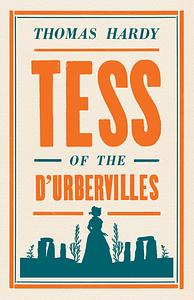Take a photo of a barcode or cover
challenging
dark
sad
tense
slow-paced
Plot or Character Driven:
Character
Strong character development:
Yes
Loveable characters:
Complicated
Diverse cast of characters:
No
Flaws of characters a main focus:
Yes
Beautifully written sentimental nonsense. I acknowledge that it's aware of its own sentimentality - the Coquette is referenced, albeit obliquely - and I also appreciated Tess' surprise behavior at the end. However, the middle portion should be called Angel Clare, as Tess becomes a secondary character. Or, even closer to the mark, it could be called Chaucer's "Clerk's Tale," with Angel as the monstrous Walter and Tess the grotesquely robotic Griselda. It's also improbable. Characters keep turning up by chance as if there are only 10 humans in all of Wessex. The prose is superb but the story is not.
"Why didn't you tell me there was danger in men folk? Why didn't you warn me? Ladies no what to fend hands against, because they read novels that tell them of these tricks"
I opened this book with so much expectation and excitement and of course it delivered. The life of Tess Durbeyfield is full. Full in equal measures... of love and loss, profound happiness and sickening pain. But like all woman she wasn't built to break. Like all of us she bent, she shifted, she changed but she didn't break.
Fun Fact : this book is over 120 years old. A classic if ever there was one, Hello Book Buddies
I opened this book with so much expectation and excitement and of course it delivered. The life of Tess Durbeyfield is full. Full in equal measures... of love and loss, profound happiness and sickening pain. But like all woman she wasn't built to break. Like all of us she bent, she shifted, she changed but she didn't break.
Fun Fact : this book is over 120 years old. A classic if ever there was one, Hello Book Buddies
adventurous
challenging
dark
emotional
reflective
sad
tense
medium-paced
Plot or Character Driven:
Plot
Strong character development:
Yes
Loveable characters:
Yes
Diverse cast of characters:
No
Flaws of characters a main focus:
Yes
A novel that has received much critique and been the victim of huge controversies, I just had to read 'Tess of the d'Urbervilles' for this influence alone. It was a journey reading it: it started heavy, stuffy, I felt it aged poorly, but the more it progressed the more immersed I became and the more worthwhile I found the experience.
This is the tragedy of Tess. Allegedly descendent from the influential and much respected d'Urbervilles, her family goes by Durbeyfield and live off the father's trades. When Tess' action cause their horse to die, she has to take measures to ensure her family still has a way to make ends meet. Her mother encourages her to appeal to those named d'Urbervilles today, who they suspect are relatives who will help her. But her so-called cousin ends up raping and impregnating Tess, events that will shadow her entire life, as well as put her chance of love at risk.
Generally rural settings are tricky for me, as are novels of manners. Small towns feel claustrophobic, and the rules and conventions of social norms are simply not something I believe in. And these factors, plus the opening scenes featuring so much writing in dialect, made me certain that this was going to be a pain. But once I got into it, pretty much at part two, I started to appreciate the writing and the voice of the author especially. The phrasing is very much of its time, there are descriptions like comparing Tess' mouth to a flowerbud, or the all-knowing narrator who tells you what would have happened if the events progressed differently, I haven't encountered this since books from the 19th century. But there is a real charm to Hardy's writing, it's evocative, and what I especially liked was the focus on hills and elevation, characters who go up and down, how they get tired, the strength and determination required.
I also liked that the author held no judgement as to what was going on, in particular as to the condition of the woman, chastity or religion, which are major themes of this book. There is harsh dialogue from the characters, calling women the 'property of men', victim blaming, yet they are told as expressions of each character than the opinion of the author. I think this contributes to this book still being relevant, even though modern readers might expect a tougher tone. I can see this vagueness appealing as much to the crowd of the 1890s as to the one of the 2020s. It allows the lens of present society to be used for observation, rather than impose an interpretation.
And this book does fantastic at opening the door to contemplation and commentary. There is so much to unpack. Personally, I found it heart-breaking, seeing Tess pay for mistakes that were not her own but were inflicted upon her, never being able to recover from these events, and experiencing only fleeting moments of happiness. It's a sad read, and no matter how unlikeable you might find the characters, there is a sense of justice, a moral compass that we all have that will play a role here. Hardy also does well at growing the characters, for example Tess becomes more street smart by concealing her looks later in the novel, and we encounter a character who has seen a lot more of the world, different ways of living, to be able to positively influence those around him on the irrelevance of these social codes.
I'd highly recommend this to readers experienced or not with classics, once you get into the substance of it it will spark so much reflection that you can hopefully bring into your own community. Yes, it's sad, it's anger-inducing, but it's worth it.
This is the tragedy of Tess. Allegedly descendent from the influential and much respected d'Urbervilles, her family goes by Durbeyfield and live off the father's trades. When Tess' action cause their horse to die, she has to take measures to ensure her family still has a way to make ends meet. Her mother encourages her to appeal to those named d'Urbervilles today, who they suspect are relatives who will help her. But her so-called cousin ends up raping and impregnating Tess, events that will shadow her entire life, as well as put her chance of love at risk.
Generally rural settings are tricky for me, as are novels of manners. Small towns feel claustrophobic, and the rules and conventions of social norms are simply not something I believe in. And these factors, plus the opening scenes featuring so much writing in dialect, made me certain that this was going to be a pain. But once I got into it, pretty much at part two, I started to appreciate the writing and the voice of the author especially. The phrasing is very much of its time, there are descriptions like comparing Tess' mouth to a flowerbud, or the all-knowing narrator who tells you what would have happened if the events progressed differently, I haven't encountered this since books from the 19th century. But there is a real charm to Hardy's writing, it's evocative, and what I especially liked was the focus on hills and elevation, characters who go up and down, how they get tired, the strength and determination required.
I also liked that the author held no judgement as to what was going on, in particular as to the condition of the woman, chastity or religion, which are major themes of this book. There is harsh dialogue from the characters, calling women the 'property of men', victim blaming, yet they are told as expressions of each character than the opinion of the author. I think this contributes to this book still being relevant, even though modern readers might expect a tougher tone. I can see this vagueness appealing as much to the crowd of the 1890s as to the one of the 2020s. It allows the lens of present society to be used for observation, rather than impose an interpretation.
And this book does fantastic at opening the door to contemplation and commentary. There is so much to unpack. Personally, I found it heart-breaking, seeing Tess pay for mistakes that were not her own but were inflicted upon her, never being able to recover from these events, and experiencing only fleeting moments of happiness. It's a sad read, and no matter how unlikeable you might find the characters, there is a sense of justice, a moral compass that we all have that will play a role here. Hardy also does well at growing the characters, for example Tess becomes more street smart by concealing her looks later in the novel, and we encounter a character who has seen a lot more of the world, different ways of living, to be able to positively influence those around him on the irrelevance of these social codes.
I'd highly recommend this to readers experienced or not with classics, once you get into the substance of it it will spark so much reflection that you can hopefully bring into your own community. Yes, it's sad, it's anger-inducing, but it's worth it.
518 pages of a woman being wronged by men. And then those men subsequently blaming it on her.
I think I'd like to put this somewhere between 3 and 4 stars. It was so....tragic. I liked it much more as it went along, but it was hard to get into at first.
slow-paced
So well written... and that's its saving grace. Every sentence is a tiny little pleasure, and you sort of go along from one to the next, and get pulled in... and it makes up for the fact that there'a no plot to speak of and the main characters are just... profoundly ANNOYING people. Honestly, I was actually happy when the sort-of villain, Alec D'Urberville, would show up. He was a dick, but at least he was a human being. But unfortunately the novel mostly focused on Tess, who, contrary to the narrator's constant assurances of her individualism and independent personhood (and maybe if he did more showing he wouldn't have had to do so much telling), really comes across as very empty-headed and strangely free of individual personality traits. I get that she's supposed to be some kind of allegory for rustic Nature, being rudely trampled by unnatural social mores and brutal technological progress, yadda yadda. In my opinion, this does not excuse Hardy from giving her a human personality or agency. But allegories aside, she's just one of those unfortunate Victorian heroines whose heads are just empty vessels waiting to be filled by their gallant lover. And her gallant lover is, sadly, an even bigger nonentity. To quote someone else, there is just no there there with these two people. Alec the dick, as well as some very-well characterized minor characters (mostly of the tragi-comic relief type), are the only glimpses of humanity. I would say that this book works as a very long prose-poem. Which is how I ended up processing it after getting about 1/4 of the way into the story. That's what kept me turning the pages. As a STORY though, it's a long, overly drawn-out slog.
challenging
dark
emotional
inspiring
reflective
sad
slow-paced
Plot or Character Driven:
Plot
Strong character development:
Complicated
Loveable characters:
Complicated
Diverse cast of characters:
No
Flaws of characters a main focus:
Complicated
dark
sad
tense
slow-paced
Plot or Character Driven:
Plot
Strong character development:
No
Loveable characters:
Complicated
Diverse cast of characters:
No
Flaws of characters a main focus:
Yes





